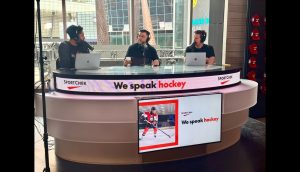It went down as smoothly as a drop of vampire blood.
Speaking at IAB Canada’s Mixx Canada Conference Series yesterday, Mike Monella, co-founder and executive creative director of Campfire, recounted the five-month interactive campaign that helped build interest for the first season of HBO’s True Blood.
Seeking to lure in fans of the vampire genre (cough, Twihards), Campfire embarked on an interactive seeding strategy starting with the core fans and expanding outwards to a more general audience.
Starting with online community research, the campaign kicked off quietly with the mailing of 1,100 letters written in a dead language to the homes of vampire fanatics. The letters built buzz and drove fans to a True Blood microsite, where more details on the project were posted. The seeding campaign went even further by sending out vials of fake blood to influential online personalities.
‘The ones who are most connected need content to fill their pipelines…We gave people a piece of our story to tell and they told it,’ Monello said. ‘They posted it on YouTube, on their blogs, people tried to sell [the vials] on eBay.’
Once the core potential fans were engaged, Monello and his team expanded with wild posters, billboards and an ever-growing campaign leading up to the series premiere, which got more viewers than HBO had expected.
‘It wouldn’t have happened if the show wasn’t fantastic,’ Monello admitted, ‘but I think we definitely helped lay the groundwork.’
Monello’s presentation was followed by Blast Radius CD Jason Theodor, who spoke of a peril much scarier than wayward vampires: campaign failure.
‘We always show the things that succeed and ask ‘why did this do so well?” he said. ‘But we don’t often do that with things that fail, and more things fail than succeed.’
Titled ‘Creativity in the Face of Chaos,’ Theodor’s talk dissected a Chevy Tahoe campaign that encouraged people to create their own spots online. The mistake in the execution, according to Theodor, was allowing people to create their own copy for the ad, which led to innumerable versions that decried the Tahoe and other SUVs as planet-killers. Other creations using the tool were simply obscene.
Though the campaign was thought to be a failure, Theodor believes the auto maker learned lessons, and that led to Theodor’s main point; because the internet is completely unpredictable, companies need to be prepared to ‘fail early and fail often.’
‘Every company should have a fail budget,’ he added. ‘Experimentation without expectation: you have no idea how valuable that can be.’
The next stop for Mixx is in Halifax on Oct. 4, and it then continues with two stops in Montreal (one English, one French), and one each in Ottawa, Winnipeg, Calgary and Vancouver.























